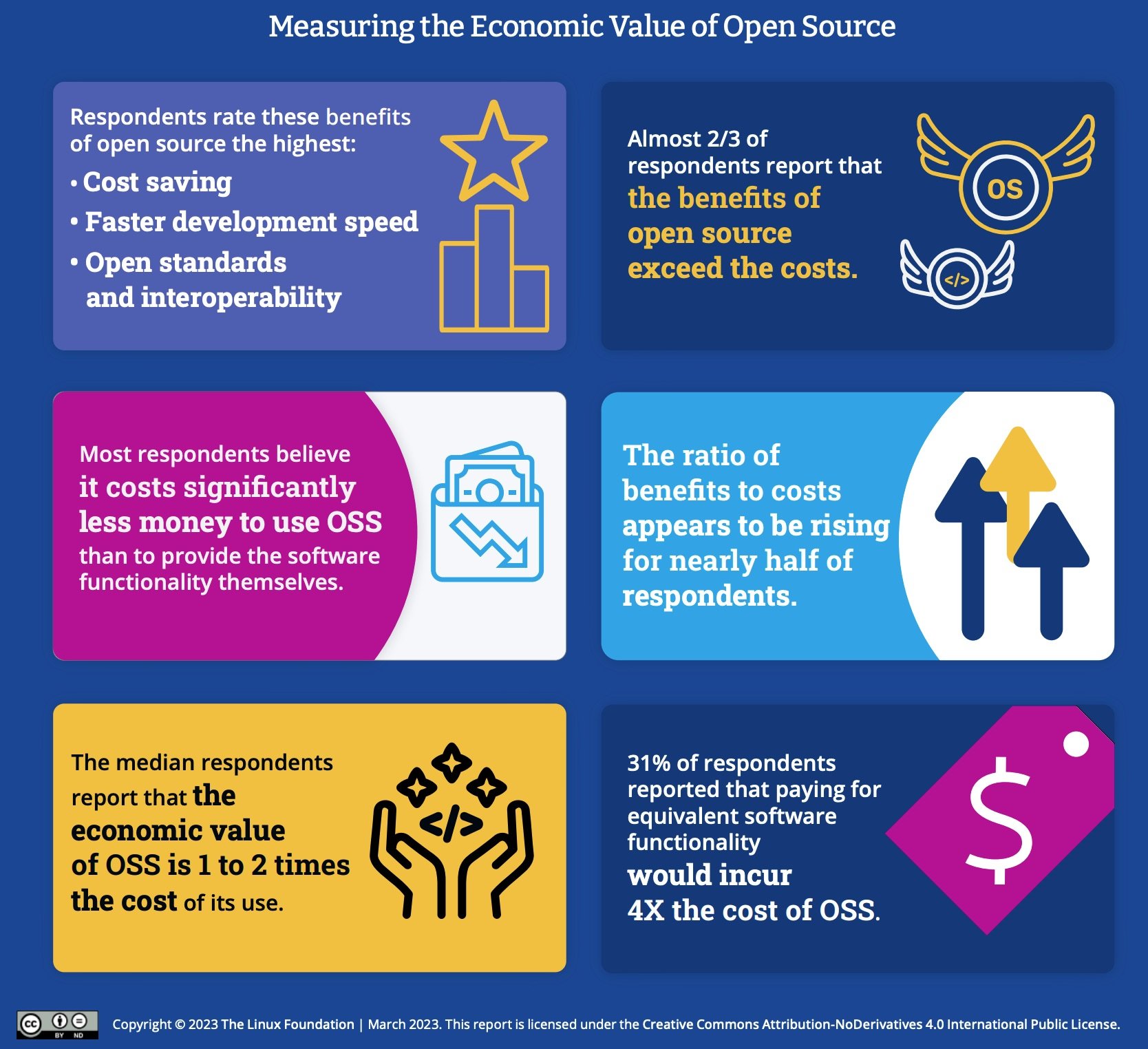The value of open source software is more than cost savings
The Linux Foundation | 07 March 2023
Open source software (OSS) has been successful beyond expectations, as evidenced by the Linux Foundation's (LF) evolution over the last two decades. However, despite the wide adoption of open source software by firms and industries worldwide, we don’t truly understand, nor can we quantify, its overall economic value to the many institutions using it.
Linux Foundation Research sponsored a survey conducted by UC Berkeley Professor Henry Chesbrough to uncover why companies embrace open source software. The study resulted in the publication of a recent report, "Measuring the Economic Value of Open Source Software: A Survey and a Preliminary Analysis," which provides insights into the economic benefits of OSS for organizations.
Key findings of the survey conducted by Dr. Chesbrough
Conducted via a survey of CIOs and IT managers, including many from Fortune 500 companies, the study found that OSS provides significant cost savings, increased innovation, and improved quality.
- The study probed the perceived costs, benefits, and value of OSS within an organization and asked respondents to think of a major project that had recently been completed that included OSS.
- It also asked the participants about the best alternative solution if OSS was not available and what it would cost to build the solution internally.
The key takeaways from the survey are as follows:

- OSS offers significant benefits to organizations, including cost savings, flexibility, security, and the ability to leverage community expertise.
- The costs of using OSS were lower than those of closed source software, and the return on investment (ROI) was positive.
- The survey results suggest that OSS has substantial economic value, with most respondents perceiving its benefits to exceed its costs. This finding is consistent with earlier survey research, which indicates that OSS provides significant value to organizations.
- The median economic value of OSS is 1-2 times its cost, which means that the benefits of using OSS outweigh its costs by a significant margin. However, there is an asymmetric disparity in the perceived economic value of OSS, with more respondents reporting highly positive results than highly negative ones.
- Lower development costs, faster deployment, and adherence to widely shared technical standards are among the key benefits of using OSS. These benefits can increase efficiency, productivity, and competitiveness for organizations that use OSS.
- Management of licensing requirements and potential security gaps are part of the costs of adopting OSS. Organizations can mitigate these costs by developing internal processes to track licensing compliance and implementing effective security measures to address potential vulnerabilities.
- Organizations that still need to adopt OSS should look beyond the initial startup costs associated with adoption to a longer-term perspective in which they can benefit more effectively from OSS. Adopting OSS can enable organizations to leverage the skills and creativity of a broader community of developers and tap into that community's collective intelligence to create more innovative and effective software solutions.
- The survey may underestimate the strategic benefits of OSS participation, as it fails to capture the ability of organizations to shape their environment or influence critical technology using OSS. Only 20% of respondents reported having open source program offices (OSPOs), leaving room for organizations to formalize their OSS initiatives. The Linux Foundation's TODO Group can help accelerate OSPO adoption within organizations.
Ultimately, the survey found that organizations are reaping significant cost savings by using OSS. Respondents reported that using OSS reduced software costs, as OSS is often free to use and can be modified to fit a company's specific needs. Additionally, using OSS reduced the need for licensing fees and proprietary software, resulting in further cost savings.
The survey results suggest that the primary driver of OSS adoption is cost savings, followed by the ability to customize the software and leverage community expertise.
Adopting open source is not just about saving money
Beyond cost savings, the study also found that OSS promotes innovation within organizations. Respondents reported that OSS encourages collaboration and knowledge sharing among developers, which can lead to new and innovative ideas. Moreover, OSS allows developers to customize software to fit their needs, increasing efficiency and productivity.
The survey also found that OSS improves software quality. Respondents reported that using OSS leads to better code quality, as the community-driven nature of OSS encourages peer review and testing. Furthermore, OSS allows organizations to quickly fix bugs and release updates, resulting in more reliable and secure software.
By embracing OSS, organizations can foster a more vibrant, surprising, and exciting future in which they can benefit from the contributions of many talented and creative developers. This approach can lead to a greater diversity of perspectives, ideas, and approaches, enabling organizations to tackle complex problems in new and innovative ways.
By reducing software costs, promoting innovation, and improving quality, OSS can help organizations stay competitive in today's fast-paced business environment. As such, businesses that still need to embrace OSS should consider doing so to reap these benefits and gain a competitive advantage in the market.

